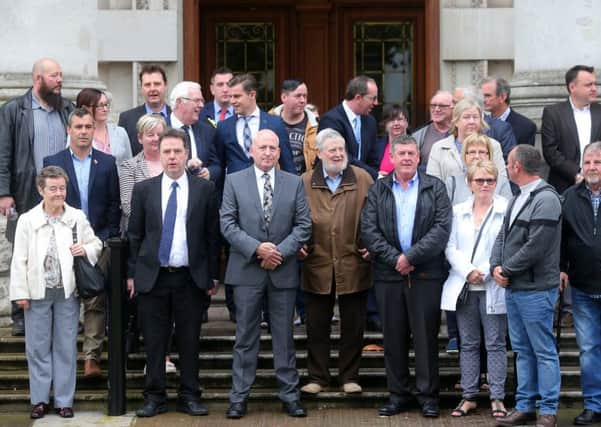Judgement slams PSNI probe into Glenanne gang


A judge in Belfast ruled that the police’s failure to conduct an overarching examination of the extent of state collusion with the Glenanne gang was inconsistent with its human rights obligations.
The Glenanne gang was a unit of the UVF that counted renegade police and army personnel among their members.
Advertisement
Hide AdAdvertisement
Hide AdThe gang has been blamed for 130 sectarian murders during the 1970s and 1980s.
The Historic Enquiries Team (HET) had partially completed a probe into the Glenanne gang before its work was halted by PSNI commanders.
The HET had examined individual murders committed by the gang but had not undertaken an overarching thematic review of the collusion allegations.
The PSNI’s decision to stop the HET review was challenged by way of judicial review by the family of one of the gang’s victims.
Advertisement
Hide AdAdvertisement
Hide AdDelivering judgment at Belfast High Court, Judge Seamus Treacy found that changes made by the PSNI to how it investigated historic cases were “fundamentally inconsistent” with its obligations in the European Convention on Human Rights.
He said its stance raised concerns among the families about the state’s commitment to investigating cases that involved alleged collusion.
He was particularly critical of decisions taken by former PSNI chief constable Sir Matt Baggott.
The judicial review was taken by the family of Patrick Barnard, who was killed in a bomb blast in Dungannon in 1976. Patrick’s brother Edward said he had not expected the outcome.
Advertisement
Hide AdAdvertisement
Hide Ad“I am shocked. I did not think we would get the victory today that we have got,” he said afterwards.
“We have proved collusion, we have proved that the police halted the report, they stopped the HET from fulfilling their part.”
Outside court, some relatives who lost loved ones to the gang wept and others applauded.
Eugene Reavey, whose three brothers were murdered in 1976, described the alleged collusion as a “war crime”.
Advertisement
Hide AdAdvertisement
Hide Ad“This was murder by the state and its agents,” he said. “There is no other word for it than a war crime - that’s how big it is.
“I am delighted for everybody here for the perseverance they have shown over the years. We have been humiliated, we have been abused by everybody in every part of the journey but today we have been vindicated.”
The judge said the Barnard family had a “legitimate expectation” that a thematic probe into collusion would have been completed.
He said the police’s treatment of them had been “unfair” in the “extreme”.
Advertisement
Hide AdAdvertisement
Hide Ad“It has completely undermined the confidence of the families whose concerns are not only still unresolved but compounded by the effects of the decisions taken by the then chief constable (Mr Baggott),” he said.
Justice Treacy added: “There is a real risk that this will fuel in the minds of the families the fear that the state has resiled from its public commitments because it is not genuinely committed to addressing the unresolved concerns that the families have of state involvement.”
The judge placed the onus on the PSNI to offer an “appropriate form of relief” that would address the family’s concerns. He said the failure to complete the Glenanne collusion report meant potential evidential opportunities had been missed.
PSNI Assistant Chief Constable Mark Hamilton said: “We understand that Mr Justice Treacy has not publicly released his judgment but will do so within the next few weeks. Once we receive the judgment we will consider it.”